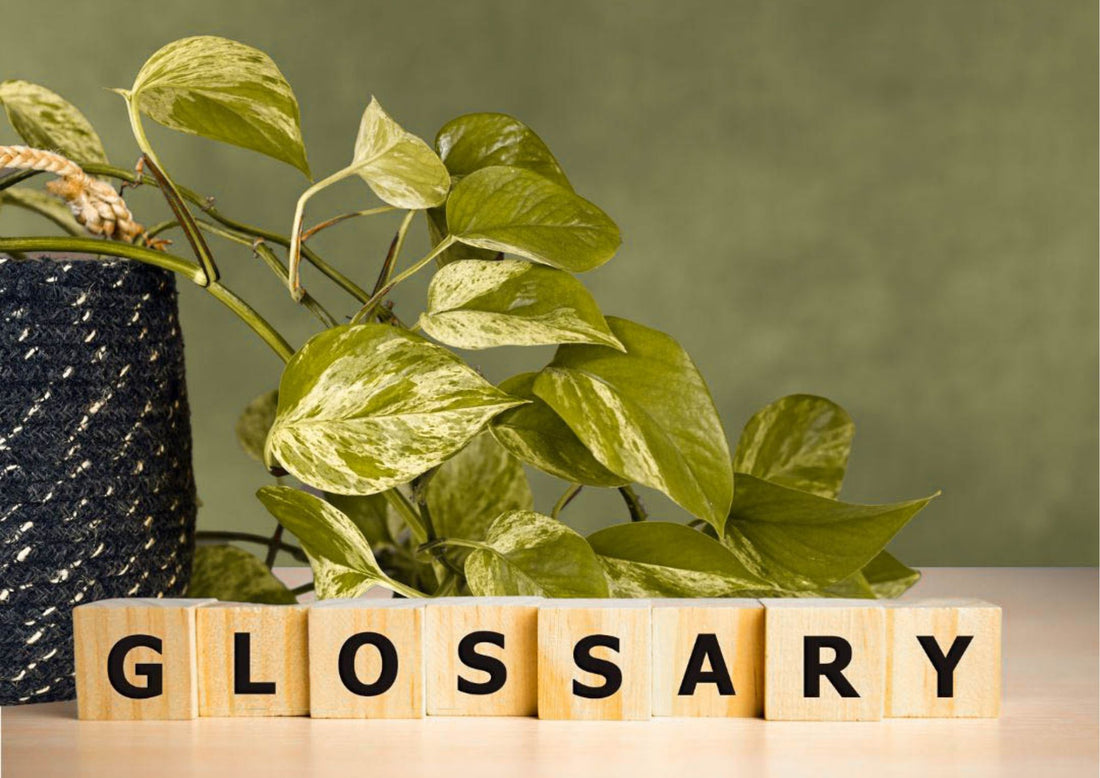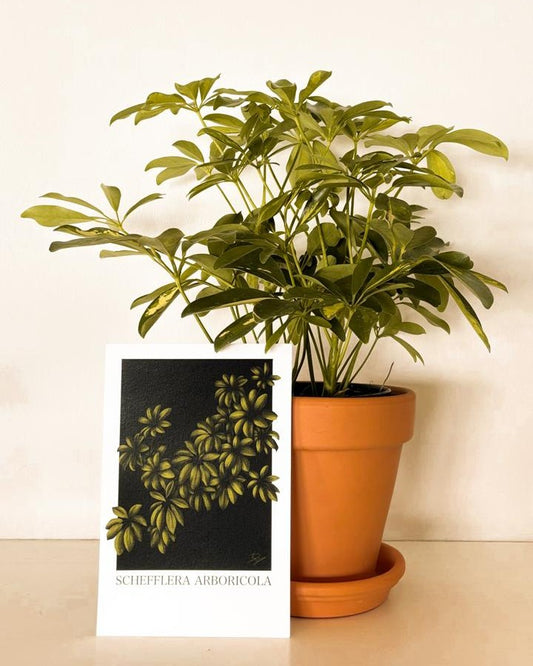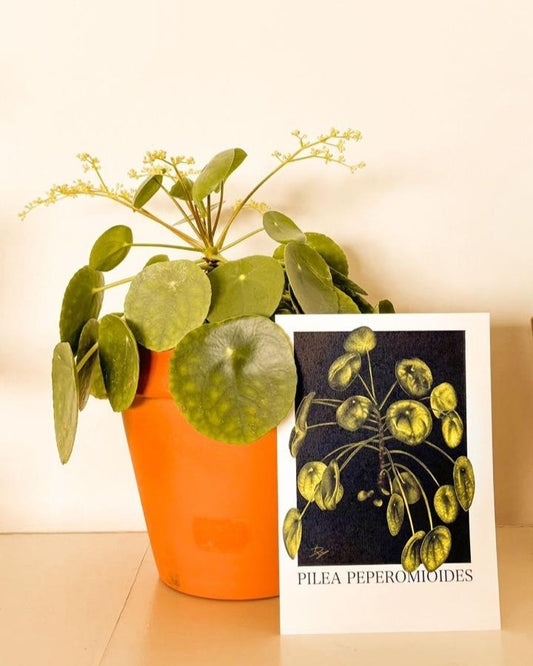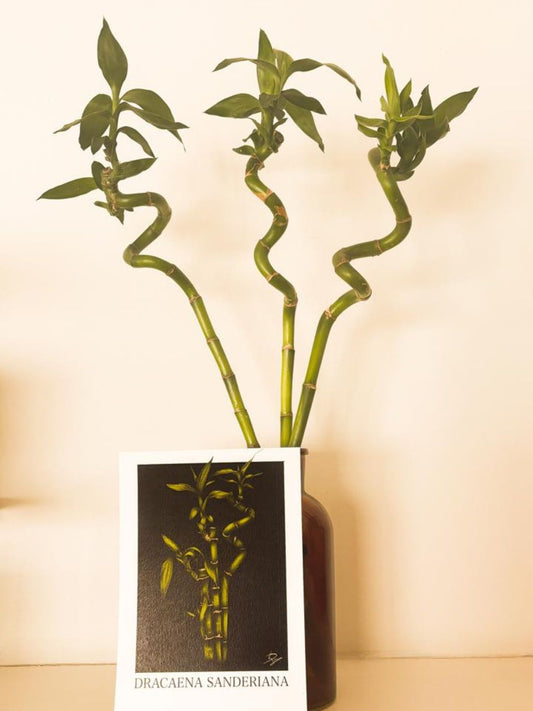Welcome to my comprehensive houseplant glossary for beginners. In this blog post, I'll help you understand common houseplant terminology and essential indoor plant care terms.
No matter how much of a plant nerd I consider myself, there have been (and probably always will be) moments where I stumble upon houseplant-related words or terms that I've never heard before.
This blog is a work in progress because, let's face it, there's always a new term sprouting up. Let me know if there are other big, intimidating plant words that you can't seem to find below.
A Houseplant Words

Acclimate - When your plant needs a bit of time to chill and adjust to a new environment.
Aeration - It's like giving your plant's roots some breathing room by letting the soil get some air.
Anthraquinones - Natural compounds in some houseplants that can cause laxative effects or irritation if ingested by pets or humans. They serve as a defense mechanism for the plant.
Aphids - Tiny bugs that love to snack on your plants' juices and cause trouble.
B Houseplant Words

Biodegradable - Materials that can naturally break down over time, often used in eco-friendly pots and containers.
C Houseplant Words

Chlorophyll - Chlorophyll is a bit like a plant's green magic; it's the magical substance that, during photosynthesis, turns sunlight into energy, giving leaves their lively color and keeping the whole plant thriving.
Coco peat - Also known as coir, this is a natural planting medium made from coconut husks. It holds water well, improves soil aeration, and is often used to enhance soil quality.
Corm - A corm is like a cozy storage room for certain plants—it's this bulb-like thing underground where the plant keeps extra nutrients, helping it survive and flourish. These corms can also be harvested and nurtured to grow more plants.
Cultivar - Think of a cultivar as a plant with a unique personality—someone took the time to nurture and develop it to be a bit different, whether in color, size, or some other cool feature. It's like giving a plant its own signature style!
D Houseplant Words

Dormancy - When a plant goes into dormancy, it's like taking a holiday – it slows down, rests, and conserves energy, especially during the colder months.
Drip Tray - A drip tray is like a plant's coaster—it's there to catch any extra water that escapes when you give your plant a drink, making sure your furniture stays dry and happy.
E Houseplant Words

Ephemeral - Ephemeral plants are like the Snapchat stories of the plant world—they show up, do their thing for a short while, and then gracefully fade away, making a brief but memorable appearance.
Epiphyte - A plant that's like a relaxed roommate - it lives on another plant, grabs a free ride for support, but doesn't cause any harm.
Evaporation - Evaporation is like the disappearing act water pulls off—it turns from a liquid into an invisible vapor, especially when your plant's leaves release moisture into the air.
F Houseplant Words

Fertilizer - Basically plant vitamins. You give it to your plants to help them grow strong and healthy. Read my blog post on fertilizing your houseplants here.
Foliage - Just a fancy word for a plant's leaves.
Fronds - The large, divided leaves of ferns and some other plants, like palms. They give plants their lush, feathery appearance and play a vital role in photosynthesis.
Fungus Gnats - Tiny, pesky insects that love hanging around your plant's soil.
G Houseplant Words

Genus - A group of plants that are kind of like botanical cousins, sharing common features but with different species.
Grafting - Grafting is a bit like plant surgery – you take a part from one plant and attach it to another to create a cool hybrid with the best traits of both.
Guttation - When your plant sweats a bit, releasing water droplets, usually from its leaf tips.
H Houseplant Words

Horticulture - The art and science of growing and taking care of plants, where green thumbs get to shine and make their leafy friends happy.
Humidity - Humidity is like how sticky or dry the air feels; it's what makes your hair frizzy or your skin feel clammy on a hot day. And some plants just love a bit more moisture in the air!
Humidity tray - A tray/saucer filled with small rocks/pebbles and water placed underneath your plant. The tray creates a moist environment to keep your plant happy and hydrated.
Hybrid - A plant that's a mix of two different species, creating something unique and special.
Hydroponic Planting - A way to grow plants without soil, using nutrient-rich water to give them a spa day for their roots, so they can grow big and strong.13 Plants That Can Grow In Water
I Houseplant Words

Insecticidal Soap - A soapy solution used to clean up unwanted pests from your plant's leaves without harsh chemicals.
Insoluble calcium oxalates - Needle-like crystals found in some houseplants that can cause irritation or discomfort if ingested or touched, making these plants potentially harmful to pets and humans. They are a common defense mechanism in plants to deter herbivores.
Internode - The space between two nodes on a stem, where the stem grows and stretches out.
Invasive Species - Plants that are a bit too ambitious—they spread aggressively and can cause trouble in new environments.
J Houseplant Words

Jungle Mix - A type of potting soil that is specially crafted to give them all the nutrients they need, mimicking the rich and well-draining earth found in tropical rainforests, so your green buddies can thrive and feel right at home.
K Houseplant Words

Kokedama - A Japanese gardening technique where a plant's roots are wrapped in moss and bound with string, creating a unique hanging ball of greenery.
L Houseplant Words

Larva - Larvae are like the baby version of bugs—the little, often wriggly stage in their life before they grow up and cause mischief in your houseplants.
LECA (Lightweight Expanded Clay Aggregate) - A reusable, mess-free growing medium that turns plant care into a clean, soil-free joyride—just add water and let the clay do the magic!
Light Meter - A device used to measure the intensity of light, helping determine suitable conditions for different houseplants.
M Houseplant Words

Macramé Hanger - A Macramé Hanger is like a trendy swing for your plant—it's this stylish hanging holder made from knotted cords.
Macronutrients - Macronutrients are the essential power trio of nutrients—nitrogen, phosphorus, and potassium—that plants need in large amounts to thrive and grow
Mealybugs - Small, soft, disgusting insects that can infest houseplants, often appearing as white, cottony clusters.
Microbial activity - Refers to the work done by tiny organisms in the soil that help break down organic matter, making nutrients more available to your plants. Healthy microbial activity is like having a bustling community of helpers in the soil, boosting your plants' growth and health.
Micronutrients - Micronutrients are the "tiny but mighty" nutrients that plants need in small doses to support crucial functions and overall health. These include iron, manganese, zinc, and many others.
Misting - Spraying a fine mist of water on the leaves of plants to increase humidity and provide moisture.
Moisture retention - how well soil holds on to water, ensuring your plants have a steady supply without drying out too quickly. Good moisture retention helps maintain the right soil humidity for healthy plant roots.
Moss Pole - A vertical structure covered in moss, mimicking natural trees, giving your plants something to creep up.
Mulch - A layer of material, like wood chips or straw, spread over the soil to help retain moisture, suppress weeds, and regulate temperature. It acts like a protective blanket for your plants, keeping the soil healthy and reducing the need for frequent watering.
N Houseplant Words

Node - The point on a stem from which leaves, branches, or flowers grow.
Nutrients/NPK-ratio - The essential nutrients for plants—Nitrogen (N), Phosphorus (P), and Potassium (K), often found in fertilizers.
O Houseplant Words

Offsets - Offsets are like the baby shoots of a plant—those little growths at the base that are basically its way of saying, "Hey, let's make more of us!"
Orchid bark - A type of tree bark, usually from fir or pine trees, used as a potting medium for orchids. It ensures good drainage and aeration, which helps keep orchid roots healthy.
Oxygenation - Oxygenation is like giving your plant's roots a breath of fresh air—it's the process of adding oxygen to the soil to keep them healthy and happy.
P Houseplant Words

Peat Moss - Peat moss is like a sponge for your plant—it's a natural material in the soil that soaks up water to keep your plant nice and hydrated.
Perennial - A plant that lives longer than two years.
Perlite - Perlite is like the plant's personal air conditioner—it's this white, light and airy stuff in the soil that helps with drainage and keeps the roots from getting too soggy.
pH level - A measure of how acidic or alkaline the soil is, which affects how well your plants can absorb nutrients. Keeping the right pH balance helps your plants stay healthy and thrive.
Photosynthesis - Photosynthesis is like a magic trick that plants do to turn sunlight, water, and air into food for themselves, kind of like how we turn ingredients into a mealPruning - Pruning is like giving your plants a haircut; it's the process of trimming away the extra branches and leaves to help them grow better and look their best.
Pollen - Nature's tiny courier, carrying vital reproductive material between flowers to facilitate plant reproduction.
Pollinators - Pollinators are nature's matchmakers, buzzing creatures that help plants find their perfect mate to produce fruits and seeds.
Proteolytic enzymes - Natural proteins found in some houseplants that break down other proteins and can cause skin irritation or digestive issues if touched or ingested by pets or humans.
Pruning - Pruning is like giving your plants a haircut; it's the process of trimming away the extra branches and leaves to help them grow better and look their best.
Q Houseplant Words

Quarantine - Isolating new plants to prevent the spread of pests or diseases to existing plant collections.
R Houseplant Words

Repotting - Giving your plant a new, slightly bigger pot when it starts feeling cramped in its old pot.
Rootbound - When a plant has outgrown its container, and the roots become densely packed.
S Houseplant Words

Saponins - Natural chemicals found in some houseplants that can cause irritation or mild toxicity if ingested, leading to symptoms like nausea or vomiting in pets and humans. They help protect the plant from pests and diseases.
Semi-hydroponics - A soil-free plant care method where roots sip water and nutrients from a reservoir, making it the chic, low-maintenance spa treatment for your houseplants.
Shingle - Refers to a growth pattern where the leaves lie flat against a surface, like a wall or tree, giving them a shingle-like appearance as they grow vertically.
T Houseplant Words

Tendril - Thin, spiraled extensions of certain plants, sometimes used for climbing or support.
Terrarium - A sealed or open glass container containing small plants, often creating a miniature ecosystem.
Topdressing - Adding a layer of material (such as mulch or decorative stones) to the top of the soil for aesthetic or practical purposes.
Topiary - Trees or shrubs that have been clipped and shaped into interesting designs like geometric shapes or animals.
Trailing - Plants with vines or stems that gracefully cascade down, adding an elegant touch to your space.
Transpiration - Transpiration is like a plant's version of sweating—it's when they release water vapor through tiny pores in their leaves to cool off, kind of like how we cool down when we perspire.
Triterpenoid saponins - Natural compounds found in some houseplants that can cause irritation or toxicity if ingested, affecting pets and humans by potentially causing symptoms like vomiting or diarrhea. They act as a defense mechanism to protect plants from pests.
Tropical - Plants that thrive in warm and humid conditions, typically associated with tropical climates.
U Houseplant Words

Underwatering - Providing insufficient water to plants, leading to dehydration.
V Houseplant Words

Variegated - Having differently colored zones or areas, often seen in leaves with patterns of green and white.
Vermiculite - A super light, mineral mix that puffs up when heated, making it great for boosting soil’s ability to hold water and air. It’s like a cozy cushion for your plants’ roots!
Vine - These are the plants that like to hang out, literally. They're the climbers and danglers of the plant world.
Vivarium - Picture a tiny jungle in a box. It's like a little plant paradise, all in one place.
W Houseplant Words

Water retention - Refers to how well soil can hold onto moisture, which is crucial for keeping your plants hydrated without them sitting in soggy soil. Good water retention helps your plants get the right amount of water they need to grow strong.
Waterlogged - When soil is waterlogged, it's like a soggy sponge, drowning plants in too much moisture and suffocating their roots.
Wicking System - A wicking system is like a plant's own self-serve water station – it uses a clever setup to let the plant pull up water from a reservoir below whenever it's thirsty, through a wick.
X Houseplant Words

Xerophyte - Plants specially built to thrive in dry places, storing water in their succulent leaves so they can handle the arid heat without breaking a sweat.
I hope this guide to houseplant terms has made it easier for you to get a handle on the key vocabulary needed for thriving indoor plants. Let me know in the comments if there are any other plant related words that you can't find on this list :)




